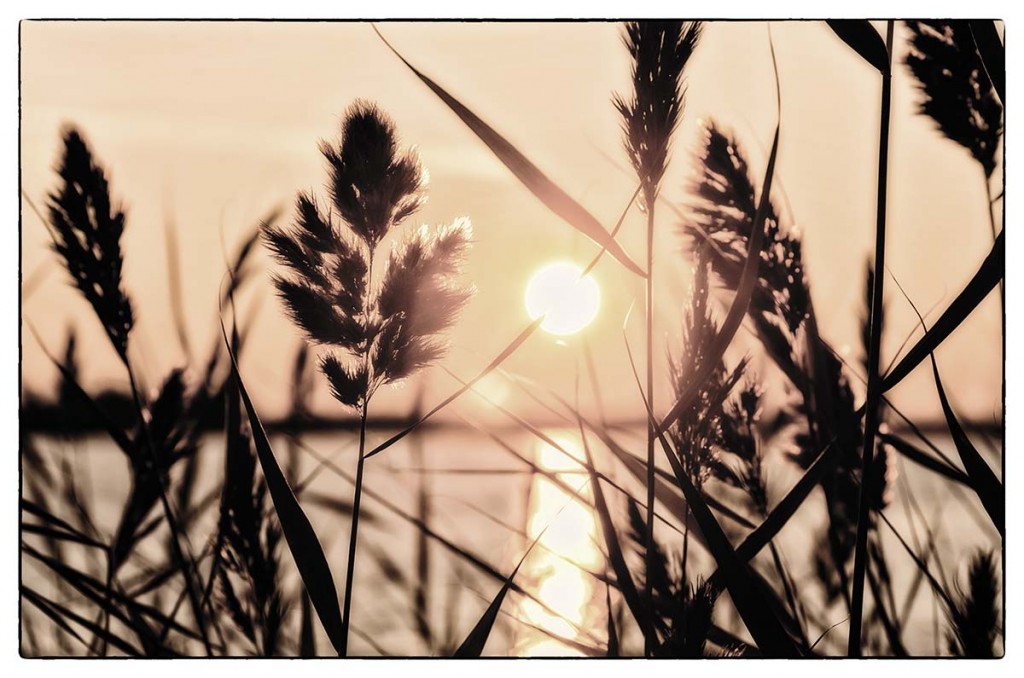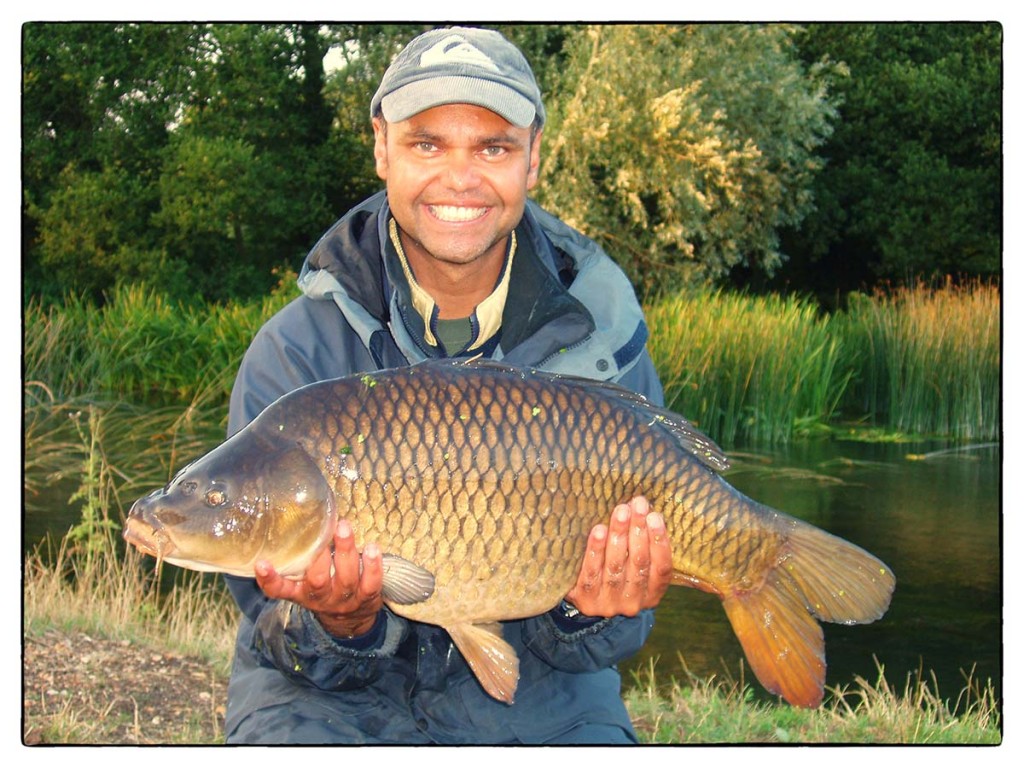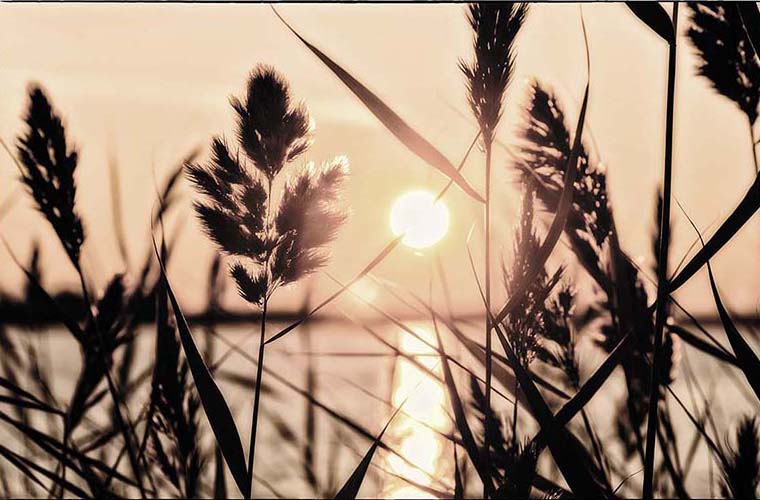 By Chris Netto
By Chris Netto
The tendrils of mist wound lazily around the tree branches as I stood on the banks of the Dorset Stour on a dull, grey, mid-July dawn. I had planned this adventure for weeks, keen to get in among Throop’s not inconsiderable chub population, but really hoping for one of its sizeable barbel. However, as with any outdoor activity in the UK, the weather was not playing ball.
There was an unseasonal chill in the air, which failed to dampen the spirits of the cheery birds singing away at the height of the breeding season; chaffinches, robins, skylarks and a tribe of long-tailed tits weaving their way through the trees. I met my friend Mark, and we crossed the bridge and made our way upstream. The riverbank was sodden due to overnight rain; our wellingtons welcome as we negotiated waterlogged banks. I was reminded of an episode of A Passion for Angling—’Childhood Dreams’—when Chris Yates and Bob James walked along the banks of the River Avon in the early morning, their rods in their hands and all they need for the day slung across their backs, with nothing ahead except a glorious day’s fishing for the ‘Prince of the River’.
We hoped our early start would mean we had our pick of swims, but one early bird had beaten us to it and had already staked a claim. He was dressed strangely (bearing in mind the chill) in bright shorts and a T-shirt that struggled to retain his large frame. His umbrella and hefty seat box suggested he would not be roaming far.
As we squelched our way down the bank a movement ahead caught my eye so we stopped in our tracks. Whatever it was, it was wrestling with something and showed little fear as we slowly began to approach. It was a mink, which disappeared into the bankside vegetation, leaving a small, chewed-up eel barely squirming on the bank, savaged beyond redemption. We moved on, sad for the eel but thrilled at seeing some wildlife, even if it was a mink.
The river was changing before our eyes, quite coloured and rising. I settled on a swim that offered some protection from the flow with trailing branches upstream slowing down the water. Mark remained further downstream where a hollowed out bank formed an eddy. “Good choice”, I thought.
Despite the weather, nature carries on regardless. I saw the inevitable kingfisher’s flash of metallic blue and orange, and heard the trademark piping sound as it went about its work. To my left a heron stalked among the rushes, its keen eyes boring into the water to locate its prey. With such sights to see, it didn’t really matter that the fishing was tough. After about a biteless half an hour I thought I heard a noise over the wind, a gush of expletives, or a shout perhaps? But it was swiftly carried away on the breeze. The weather worsened and light drizzle gave way to a full-blown storm with driving rain. I persevered, but the subsequent thunder and lightning saw Mark and I seek the only shelter we could find that wasn’t under a tree, a mere dip in the ground where the contours protected us from the rain.
I looked at Mark and saw that he was already soaking wet. “What happened to you?” I asked. “I fell in”, he responded sheepishly. “So that explained the noise I heard,” I replied. Despite being annoyed about the possible fatal consequences of such an incident when two anglers fish too far apart from each other, I still pulled his leg about it.
Soon the skies cleared. A drier Mark and I walked back to the bridge, where we came across the lone angler—what a sight! He was soaked through, his umbrella in pieces with its torn edges waving in the wind like a flag of surrender. His already eye-wateringly tight attire was now almost transparent. We tried to look away but something kept drawing our eyes back to him—like the star of a Victorian curiosity show. He was thoroughly annoyed, packing up, cursing as he went. The bent and twisted umbrella was carelessly discarded on the bank as a skeletal memorial to his misfortune.
We moved on, eventually finding a beautiful swim much further along. But the walk was worth it—a broad expanse of straight river, about 30 yards wide, with the opposite bank lined with rushes. Mark settled down a little closer to me this time, certainly within screaming distance.
By midday the weather had turned again, and was now bright and sunny, with the river quickly becoming clear as the level subsided. I put two rods out—a sleeper rod with a fishmeal pellet glued to a braid hair rig and running ledger, cast to the far bank along the rushes and at a slight angle downstream, in a gravel-bottomed channel running at the base of the reed bed. “A certain fish patrol route”, I thought.
Wanting to be more active with my second rod, I float-fished maggots about ten feet out. A handful to get the swim going soon saw me catching small dace. As is often the case, every so often the bites would dry up, so I would rest the swim for 20 minutes before hand-feeding a few more maggots to get things going again. If present, the dace and minnow shoals would go into a short feeding frenzy and I would catch a few more while I waited for the sleeper rod to hopefully tempt something bigger.
By midday the temperature had risen considerably and the T-shirts came out. I saw the dace scatter from the introduced bait. I was curious. Repeating the action I glimpsed a perch of about a pound appear from the weed, strike at the dace, then disappear into a deep hole barely a yard out. I caught another dace, and again saw the perch strike at the feeding shoal. Excitedly I removed the 2lb cast and replaced it with a size six hook straight through on 12lb mainline and changed the light float for a chubber. That unfortunate last dace was cast just upstream of the hole, followed by another handful of maggots. Once again the perch appeared and my float dipped. I struck but hooked nothing. I did this twice more, each time feeling the fish momentarily before loosing it. Time to have a rethink.
I remembered the Mr Crabtree book I read as a kid, where he tells Peter to wait for the float to disappear when live baiting for perch. Inexperienced as I was with live bait, and despite worrying about deep hooking, I cast as before, and again the perch came out to strike. My float dipped and slid across the surface before disappearing. I waited as long as I dared, then struck. This time I made contact and following a short, jagging fight I slipped my net under a bristling, angry perch of 12ozs. The colours of a clear-river perch are something to behold, and I took the time to enjoy the resplendent red, black and greens while it glared back at me, before releasing it a bit further downriver.
Feeling rather pleased with myself, I repeated the process and caught another four perch, the biggest just over a pound; not record breakers but memorable nonetheless. They were brassy and full of attitude, with blood red fins, and in the sunlight they almost glowed.
Meanwhile, Mark caught a small bream, and we were getting hopeful as activity across the river increased as the day grew older, but despite this, we failed to add to our tally over the next few hours. Then, at about 4pm, larger perch gave away their presence as fry scattered mid-river. By now the water was running clear and you could see the hunting perch chasing down their small prey. Although I had read about this, I had never witnessed it before and it was fascinating to watch. At times the perch pursued their quarry in bursts covering 10 yards or more, their dorsal fins often breaking the water, forming clear cut Vs in the surface, as they harried their intended dinners. But the dace had disappeared and I had no lures with me, so try as I might I could not catch one of these active hunters.
A lull of calm followed this burst of activity, and we settled down with all rods on the bottom in preparation for the evening. The temperature had dropped again and in the waning sunlight some warmer clothes went on. All was quiet until the alarm on my far bank rod signalled a bite. I lifted the rod and it immediately curved over as a good fish pulled against me. A big swirl was followed by a flash of gold and I said “Yes” under my breath as I believed I had finally made contact with my much wanted Throop barbel. Even with 12lb line, I did not bully it, but instead swung it across the current keeping a firm but gentle contact. The fish seemed confused as it did not pull hard until it got nearer the net, at which point it swam diagonally away, zipping line off the reel in a determined, ferocious run. Mark joined me with the net, as it was clearly a good fish. I was so focussed on landing it that by the time Mark netted it, I hadn’t actually seen it, apart from the occasional flashes of gold in the evening light. Finally pausing for breath, I was slightly bemused when Mark began lifting, then stopped. “It’s a really good fish. Can you help me lift it?” he said. Expecting a low double-figure barbel, I thought “Man up”!
I took the landing net from him and with a firm grip of the mesh, heaved it up onto the bank, and to my surprise, within the folds sat a gorgeous river carp, a glorious common, gulping back at me in the evening sun. My first river carp and it was a beauty!

A little stunned both at the size and the species, I grabbed my scales and weigh sling, easily unhooked the fish, and carefully weighed it. It looked absolutely huge, and with bated breath I watched the numbers change on the scales: 19-07lbs (after deducting the sling). I was in such a daze that I still can’t quite remember Mark taking the photograph, but I do remember slipping that fish back into the river and watching it disappear into the bright green fronds of weed that undulated in the current. I tried fishing on but I had had enough, and elated, we soon packed up. Walking back to the car, I remembered that very same A Passion for Angling episode again, and how Mr Yates struck into what he thought was a barbel, only to find he’d actually hooked a 10lb river carp. “It looked distinctly like a carp. It is a carp! What’s a carp doing in a classic barbel swim like this?” Who knows? But I for one am glad.
Looking back I can’t believe how close I was to a river twenty, but the thought never entered my mind at the time, so taken was I with the river backdrop, the waning evening sunlight and a most beautiful fish.
Rather than walk miles and pit their skills against a wild, natural quarry, the youth of today are being brought up on a diet of commercials where named carp rule and skills to catch are often limited to a bolt rig and a boilie. Of course everything has its own merit, but to me the mystery of a river and an unexpected capture is hard to beat .

